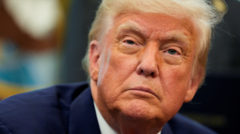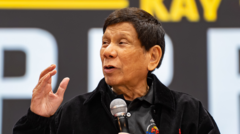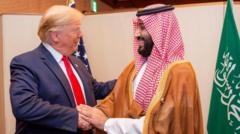Examining the foreign policy landscape reveals a shift from Biden’s alliance-building to the uncertain future under Trump’s leadership.
**Biden’s Legacy on China: A Path for Trump?**

**Biden’s Legacy on China: A Path for Trump?**
As President Biden prepares to pass the baton, the contrasting strategies towards China are coming into focus.
In a time where global dynamics constantly shift, President Biden's administration has made significant headway in constructing a united front against China's growing influence. With a focus on strengthening alliances, Biden engaged with key partners in the Asia-Pacific region, notably Japan and the Philippines. His call with their leaders last Sunday, alongside Secretary of State Antony Blinken's recent diplomatic visits to South Korea and Japan, signal a commitment to maintain a cohesive strategy amidst challenges posed by Beijing.
However, as Donald J. Trump prepares for his return to office, he seems poised to unveil a contrasting approach. Trump's invitation to Chinese President Xi Jinping to attend his inauguration, combined with their recent phone conversation, indicates a possible thawing of relations or perhaps a pivot towards prioritizing economic negotiations over strategic competition. This is in stark contrast to Biden’s legacy of strengthening alliances to curb China's ambitions.
Biden’s administration has crafted a nuanced framework of "managed competition" to address the complexities of U.S.-China relations. This strategy appears to build upon the groundwork laid during Trump’s tenure, which saw an initial focus on economic disputes but also a depiction of Xi as a figure of admiration. The question remains: Will Trump continue Biden’s containment strategy or forge a new path of engagement with China, possibly influenced by advisors like Elon Musk who support business expansions with the East?
As the transition unfolds, analysts will be closely monitoring Trump's moves, weighing their potential impact on the U.S's global standing and its relations within the Indo-Pacific region. The forthcoming decisions with regards to China could reshape not just U.S. foreign policy, but also the very fabric of international relations as seen through the lens of competitive advantage and economic collaboration.
However, as Donald J. Trump prepares for his return to office, he seems poised to unveil a contrasting approach. Trump's invitation to Chinese President Xi Jinping to attend his inauguration, combined with their recent phone conversation, indicates a possible thawing of relations or perhaps a pivot towards prioritizing economic negotiations over strategic competition. This is in stark contrast to Biden’s legacy of strengthening alliances to curb China's ambitions.
Biden’s administration has crafted a nuanced framework of "managed competition" to address the complexities of U.S.-China relations. This strategy appears to build upon the groundwork laid during Trump’s tenure, which saw an initial focus on economic disputes but also a depiction of Xi as a figure of admiration. The question remains: Will Trump continue Biden’s containment strategy or forge a new path of engagement with China, possibly influenced by advisors like Elon Musk who support business expansions with the East?
As the transition unfolds, analysts will be closely monitoring Trump's moves, weighing their potential impact on the U.S's global standing and its relations within the Indo-Pacific region. The forthcoming decisions with regards to China could reshape not just U.S. foreign policy, but also the very fabric of international relations as seen through the lens of competitive advantage and economic collaboration.





















